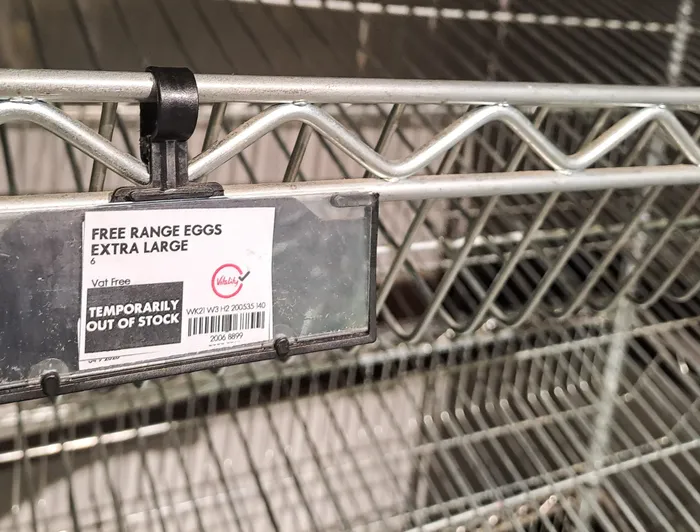Avian flu not a human health concern, but poultry industry faces a big knock

South Africa - Pretoria - 4 October 2023 - Empty egg shelves in grocery stores. The country is facing an egg shortage due to an avian flu outbreak. Picture: Jacques Naude / African News Agency (ANA)
Retailers are moving up efforts to manage the eggs shortage as the country battles an avian flu outbreak.
Millions of chickens have been culled in an attempt to prevent the spread of the disease.

Researchers said the current outbreak was the worst the country had seen.
Some shops have resorted to limiting the number of eggs each customer may buy.
The outbreak is proving to be a threat to food security, forcing consumers to dig deep in their shallow pockets. A tray of 30 eggs is now priced from R79.00 to R120.
Dr Lia Rotherham, of the Vaccines and Diagnostics Development Programme, said in an interview with one of the broadcasters that the country was currently facing the H7 and H6 strain which was something it had never seen before, being familiar with only the H5 strain.
“We now have a H7 strain, we are busy looking into that. We do know that it is not contagious to people. There is no risk of people getting the strain from the birds but it does have a huge economic impact in the poultry industry,” said Rotherham.
Agriculture, Land Reform and Rural Development Minister Thoko Didiza said her department was focusing on measures to improve egg availability across the country.
Didiza, Trade and Industry Minister Ebrahim Patel and retailers met yesterday to discuss the challenges the country was facing because of the outbreak. This followed a meeting held last Friday.
“One of the things that has come up here is that the challenge is not so much on the products, which means the availability of poultry meats on our shops. However, where we may have a challenge is actually on the eggs and the reason being that the breeding stock of chicken layers is what has been mostly affected, which has really created a challenge in the volumes of eggs that can be produced,” said Didiza.
“But with the eggs, we will be looking at importing in the southern region, but also in Brazil and the US and in terms of that import, it will address the issue of table eggs, but also fertilised eggs so that we can quickly come back on stream in terms of our layer chicks that we need,” Didiza said.
When it comes to vaccination, Didiza said they were looking at vaccination “as we speak”.
A family-owned farm in Mpumalanga started commercialising operations amid securing R300 000 from the government to scale up for their chicken project.
Poultry farm manager Charles Ntladi said staying on top on what was happening in the industry helped them prepare for the worst and protect their stock.
“We are aware of the outbreak, as farmers we have made means that we don't have this (avian flu) in our stock. We don’t see any increase any time on the farm. We sell a tray of 39 eggs for R50,” he said.
Chan Pillay of Woolworths said they had seen the impact of the outbreak particularly in Gauteng and KwaZulu-Natal, and they had decided to prioritise all products that use eggs. They were also limiting the number of eggs per customer.
“This is to make sure we have sufficient availability for our customer base and to ensure our supplier partners have availability of free-range-eggs,” he said.
Pillay further said: “From a supplier point of view, we need to review our volumes across the country and ensure all our supply partners that are stationed across the country have sufficient eggs for production of the associated product.”